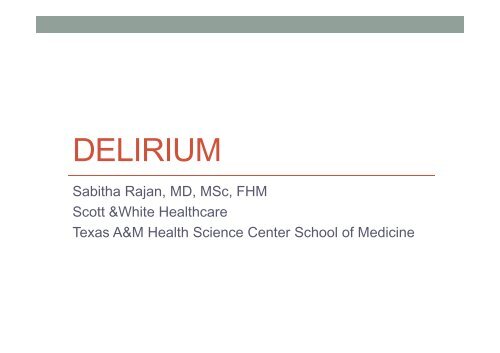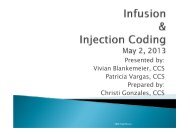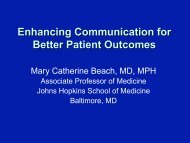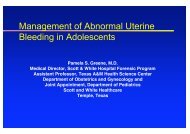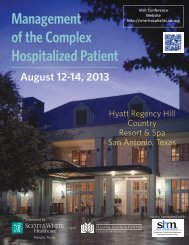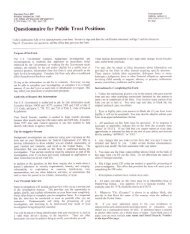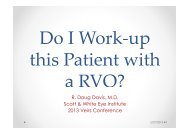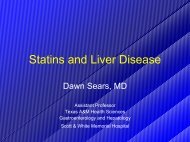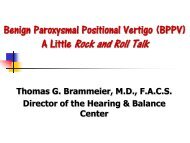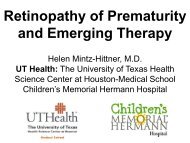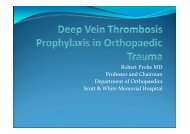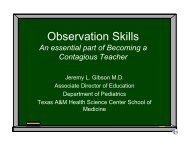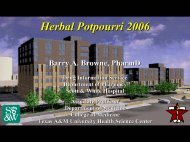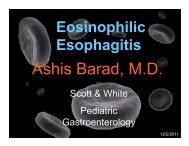Delirium: Is There a Cure for "Hospitalitis"? - Healthcare Professionals
Delirium: Is There a Cure for "Hospitalitis"? - Healthcare Professionals
Delirium: Is There a Cure for "Hospitalitis"? - Healthcare Professionals
Create successful ePaper yourself
Turn your PDF publications into a flip-book with our unique Google optimized e-Paper software.
DELIRIUMSabitha Rajan, MD, MSc, FHMScott &White <strong>Healthcare</strong>Texas A&M Health Science Center School of Medicine
Disclosure• Milliman Care Guidelines - Editor
Objectives• Define delirium• Epidemiology• Diagnose• Prevent• Treat• Counsel
Define <strong>Delirium</strong>• Acute state of confusion• Sudden onset• Progresses during several hours to days• Fluctuating course• Can alternate between agitation/restlessness and fatigue/indifference• Inattention• Hallmark of diagnosis – <strong>for</strong>getful, confused• Abnormal level of consciousness at times• Hypoactive delirium (25%)• Fatigued• Hyperactive delirium (25%)• Hallucinations• Agitated• Mixed (50%)
AKA• Acute confusional state• Toxic encephalopathy• Organic brain syndrome• ICU psychosis
In patients aged 70 and olderGeneral Medical Inpatient Ward17%No <strong>Delirium</strong>17%66%Present on AdmissionDevelops duringAdmission
Epidemiology• Up to 75% of patients in an ICU• Up to 85% at the end of life
Important? In the Hospital:• Up to ten times the risk of mortality• Three to five times the risk of a nosocomial infection• Prolonged length of stay• Greater chance of nursing home discharge as opposed toa home discharge (73% vs 30% in one study)• Increased costs estimated at $38-152 Billion annually
After Discharge• Once thought to be an acute problem that resolved• Prolonged risk <strong>for</strong> mortality lasts <strong>for</strong> up to 2 years• At risk <strong>for</strong> poor functional and cognitive recovery
Post-operative deliriumSaczynski JS et al. N Engl J Med 2012;367:30-39
Challenging to Diagnose• Index of suspicion• Agitation present in less than 25% of cases• 50-80% of cases remain undiagnosed• Screening• SQiD (single question in delirium)• “Do you think [insert pt name] has been more confused lately?”• 80% sensitive and 71% specific in hospitalized oncology patients
Differential Diagnosis• Sundowning• If it is a new pattern, assume delirium• Established sundowning can be worse in the hospital• Neurologic (focal)• Wernicke’s aphasia• Bifrontal lesions• Nonconvulsive status epilepticus• Facial twitching• Nystagmus• Automatisms• Psychiatric diagnosis• Depression• Dementia
<strong>Delirium</strong> vs. Dementia• Why is it difficult to differentiate?• Often co-exist• Dementia with Lewy bodies can be associated with fluctuations inmental status and visual hallucinations
<strong>Delirium</strong> vs. DementiaOnset and courseDementiaslow onset over monthsor years<strong>Delirium</strong>sudden onset over hoursor daysSpeech normal slurredinattentive, easilyAttentionnormaldistractedMemory gradual memory loss more <strong>for</strong>getful than usualHallucinations possible commonMoodnormal or depressedanxious, fearful,suspicious, indifferentGeneral health usualsign of illness or drugside effect
Diagnosis• Entirely clinical! <strong>There</strong> is no objective test.• Determine the timeline of the mental status changes• Are they fluctuating?• What is the level of consciousness?• What is the ability to pay attention?
Multifactorial Risk AssessmentPredisposing FactorsAgeDementiaStrokeParkinson’s DiseaseMultiple Co-morbiditiesImpaired VisionImpaired HearingFunctional Impairment (ADL)MalesAlcohol abusePrecipitating FactorsNew acute medical problemExacerbation of chronic medicalSurgery and/or anesthesiaNew psychoactive medicationAcute strokePainChange in environmentUrinary retentionConstipation/ImpactionDehydrationSepsis/Infection
Mnemonic <strong>for</strong> Precipitating FactorsDrugsElectrolyte imbalanceLack of drugsInfectionReduced sensory inputIntracranialUrinary or fecal problemsMyocardial (heart) and lungsmedications, recently started or stopped,changes in dosages, over-the-countermedications, herbals, alcoholespecially from dehydrationstopping medications, alcohol withdrawalurinary or respiratory tract infections;blood or wound infection after an injuryor surgerypoor or uncorrected vision and hearingstrokeinability to empty bladder or bowelheart attack, pneumonia, or othercondition causing lack of oxygen in theblood and the brain
Scales• <strong>Delirium</strong> Observation Screening Scale (DOSS)• <strong>Delirium</strong> Rating Scale (DRS)• <strong>Delirium</strong> Rating Scale-Revised-98 (DRS-R-98)• Digit Span Test• Global Attentiveness Rating (GAR)• Memorial <strong>Delirium</strong> Assessment Scale (MDAS)• Mini-Mental State Examination (MMSE)• Nursing <strong>Delirium</strong> Screening Scale (Nu-DESC)• Vigilance “A” Test
Confusion Assessment Method (CAM)The copyright of the CAM is owned bySharon K. Inouye, Yale University Schoolof Medicine. A training manual andpermission to use the CAM are availableonline athttp://www.hospitalelderlifeprogram.org/pdf/TheConfusionAssessmentMethod.pdf
Tests <strong>for</strong> Attention• Squeeze or raise hand when they hear a letter in a list:• G D H A U A I W P A• Spell WORLD backwards• Recite serial 7’s or 3’s• Show pictures or objects and ask <strong>for</strong> recall in one minute• Days of the week (or months) backwards• Digit span - up to 5 <strong>for</strong>wards and 4 backwards
Labs and Imaging• Tailored to history and exam• Electrolytes• CBC if anemia is considered• LFT’s, ammonia if hepatic encephalopathy is considered• ABG <strong>for</strong> hypercarbia• Toxicology screen and drug levels• Cultures and UA• CXR• MRI Brain• EEG• Lumbar Puncture
Prevention and Management of <strong>Delirium</strong> in the Older Hospitalized Patient.Inouye SK. N Engl J Med 2006;354:1157-1165.
<strong>Delirium</strong> Management• Make diagnosis• Support/educate patient and family• Non pharmacologic interventions• Establish goals (need prognosis)• Consider work up/treatment of potentially correctibleetiologies• Aggressively treat distressing symptoms
Non-pharmacologic Interventions• Cognitive• Orientation (calendar, caregiver names)• Activities (cognitively stimulating)• Sleep• Regular routine• Sleep aids (relaxing music, massage)• Environmental (eliminate noise, night time meds)• Mobility (range of motion, limit IV’s, etc)• Visual Aids (glasses, large dial phones, etc)• Hearing Aids (check ear wax)• Volume repletion <strong>for</strong> dehydration (beverage of choiceavailable and offered frequently)
Pharmacologic Treatments• No medication is FDA approved <strong>for</strong> the treatment ofdelirium• No published double blind, randomized, placebocontrolled trials• Few controlled trials• Small numbers• Various patient populations• post op, ICU, cancer, AIDS, hip fractures
Haldol vs. Benzodiazapenes• Double blind RCT• 244 AIDS patients• 30 (12%) patients developed delirium• Haloperidol (n =11)• Chlorpromazine (n = 13)• Lorazepam (n = 6)• Haloperidol equivalent to chlorpromazine > lorazepam
Inouye SK. N Engl J Med 2006;354:1157-1165
Antipsychotics• Typicals (haloperidol, chlorpromazine) have greatestevidence base, are cheaper, and have multiple routes ofadministration
Antipsychotics & Black Box• Mortality increased in dementia with antipsychotics• Black Box Warning <strong>Is</strong>sued in 2004• Consistent across all antipsychotics• Relative risk = 1.6 1.7• Absolute risk = 3.5% vs. 2.3% with placebo• Number Needed to Harm = 83• Number need to treat = 5 14• For every 9 25 persons helped, 1 death associated with use• <strong>Delirium</strong>• No evidence that mortality is increased• Not examined closely
Prevention• Prospective matched trial of usual care vs ELP (Elder LifeProgram) in 852 enrolled patients• Inouye SK. A Multicomponent Intervention to Prevent <strong>Delirium</strong> inHospitalized Older Patients. N Engl J Med. N Engl J Med 1999;340:669-676• Geriatric Consult• Marcantonio ER, Flacker JM, Wright RJ, Resnick NM. Reducingdelirium after hip fracture: a randomized trial. J Am Geriatr Soc2001;49:516-522• Antipsychotics• Kalisvaart KJ, de Jonghe JF, Bogaards et al. Haloperidol prophylaxis<strong>for</strong> elderly hip-surgery patients at risk <strong>for</strong> delirium: a randomizedplacebo-controlled study. J Am Geriatr Soc. 2005;53:1658-66.
Risk Factors <strong>for</strong> <strong>Delirium</strong> and Intervention Protocols.Inouye SK et al. N Engl J Med 1999;340:669-676.
Cumulative Incidence of <strong>Delirium</strong> According to Study Group.Inouye SK et al. N Engl J Med 1999;340:669-676.
Prevention – ELP intervention• The cost of intervention per case of delirium preventedwas $6,341• No difference in LOS or mortality• HELP (Hospital Elder Life Program)• http://www.hospitalelderlifeprogram.org/public/public-main.php
Prevention – Geriatric Consult• Geriatric Consultation• 126 patients aged 65 and older admitted emergently with hipfracture• Randomized trial of Usual care vs Geriatric consults• Average of 10 (!) recommendations with 77% compliance• <strong>Delirium</strong> in consult group reduced by over 1/3• Severe delirium in consult group reduced by over 1/2
Prevention - Medication• High risk patients with hip fractures received haloperidol0.5mg three times daily• Reduced severity and duration of delirium but notincidence• All three approaches were preventative
<strong>Delirium</strong> at end of life• Up to 85%• At end of life, etiology varies• 42% dehydration• 29% liver failure• 25% medication• Why treat?• QOL• Time <strong>for</strong> patient and family• Can help 50% of the time• Constipation, Retention• Adjust medications• Hydrate as per family and patient wishes
Guidelines and Resources• PIER from ACP• http://pier.acponline.org• American Psychiatric Association• http://psychiatryonline.org/guidelines• National Institute <strong>for</strong> Excellence (NICE)• http://www.nice.org.uk/cg103• Vanderbilt University ICU• www.ICUdelirium.com (Pocket cards can be downloaded here)
Patient and Family in<strong>for</strong>mation
Selected References• Marcantonio ER. In the clinic. <strong>Delirium</strong>. Ann Intern Med.2011 Jun 7;154(11):ITC6-16.• Lonergan E, Britton AM, Luxenberg J, Wyller T.Antipsychotics <strong>for</strong> delirium. Cochrane Database Syst Rev.2007:CD005594.• Inouye SK. <strong>Delirium</strong> in older persons. N Engl J Med.2006;354:1157-65.


